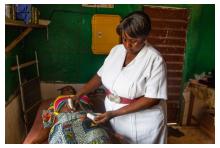Every day, almost 800 women die in pregnancy or childbirth. Almost all of these women—99 percent—live and die in developing countries. Having skilled health care during pregnancy and childbirth is one of the most important interventions to reduce the number of women and babies who die or are injured, yet in developing countries only 65 percent of mothers give birth with a skilled provider. In many of the least developed countries, this number drops to only 20 percent of women.
Midwives are on the frontlines of providing essential care to mothers and newborns. However, the global shortage of roughly 334,000 professional midwives according to the World Health Organization (2005) means that many women and babies die from complications that could have been prevented by a health worker with the right training, equipment and support. The State of the World’s Midwifery Report (2011) found that 3.6 million lives could be saved each year by doubling the number of well-trained and supported midwives providing care in the 58 countries where most maternal and newborn deaths occur.
Direct Relief supports midwife-training institutions and health facilities in countries with some of the highest maternal and infant mortality rates in the world. Direct Relief provides trained midwives with the essential equipment that they need to deliver skilled care to ensure the lives of mothers and infants during pregnancy and childbirth. Without access to critical supplies and equipment, midwives are not able to fully implement their life-saving skills.
